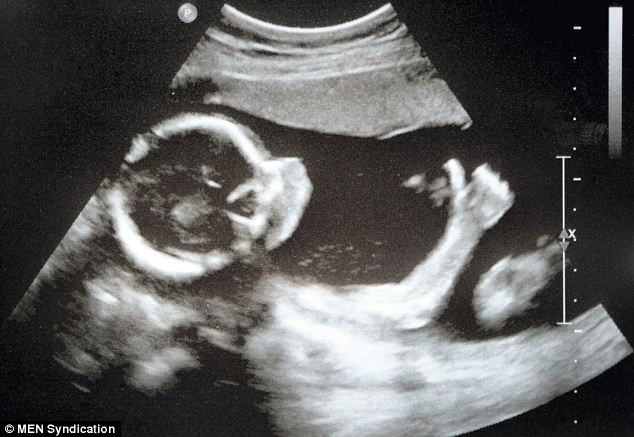David F. Forte: From Termination to Extermination: The International Down Syndrome Genocide
Public Discourse 23 July 2018
The beautiful, happy 2018 Gerber Baby, Lucas, is lucky to be alive. Most children diagnosed with Down syndrome in utero are now killed before birth.
Ever since 1928, Gerber Baby Foods has illustrated its products with a sketch of a beautiful child who was chosen after a nationwide contest. Beginning in 2012, Gerber supplemented its cherubic logo with an advertising campaign featuring an additional child, also chosen in an open competition.
This year, out of 140,000 submitted entries, Gerber chose a smiling two-year-old named Lucas. Last month, Gerber arranged for the two babies—the original 1928 Gerber baby and the 2018 Gerber baby—to meet.
Estimates vary, but in the United States, abortions of children whose Down syndrome is detected in the womb are in the range of about 67 percent. The lethal discrimination practiced against such persons has become a worldwide phenomenon. Iceland has trumpeted its success in eliminating people with Down syndrome from the island. Denmark, whose people heroically saved over 95 percent of the Jews living there during World War II, now boasts that 98 percent of unborn children with the condition are aborted. Italy, Germany, France, Switzerland, England, and Belgium all have rates exceeding 90 percent.
Hitler wanted Europe to be judenrein, scrubbed clean of Jews. It seems that today Europe aspires to be DownSyndromerein.
Despite the fact that a majority of children with Down syndrome are aborted in the United States, each year about 6,000 babies with Down syndrome survive pregnancy and are born here. In Europe, the situation is more dismal. In England, about 700 are born each year. In 2017, only four children whose Down syndrome was detected in the womb were permitted to be born in Denmark. There are virtually none in Iceland.
Protecting Babies with Down Syndrome
Down syndrome, or trisomy 21, occurs when there is an extra copy of chromosome 21. It most often occurs in pregnancy of women who are over thirty-five years of age. Common effects of Down syndrome include a smaller stature, a slight flattening of the rear of the skull, slightly upward slanting eyes, a degree of mental retardation, and heart and eyesight problems. Life expectancy is now around sixty years. Just forty years ago, life expectancy was only twenty-five years, and in 1929, it was a mere nine years. In the main, Down syndrome children are happy and outgoing.
On December 22, 2017 Governor John Kasich of Ohio signed the Down Syndrome Non-Discrimination Act, which prohibits abortions of unborn children who have been diagnosed with Down syndrome. In March 2018, federal district judge Timothy Black, responding to a suit by the ACLU, issued a preliminary injunction preventing the Act from going into effect. Similar laws in Indiana and Louisiana have also been stayed, but a North Dakota law protecting unborn children with Down syndrome has taken effect.
The Humanity of the Unborn Child
For the last twenty years, in the United States, states have passed myriad statutes attesting to the humanity of the unborn person. In addition to Down syndrome laws, they include such measures as fetal homicide acts, born alive acts, pain-capable restrictions, ultrasound requirements, sex-selection prohibitions, twenty-week bans, informed consent laws, heartbeat bills, and counseling and adoption opportunities. The next stage in abortion jurisprudence will be to grapple with the central fact of the humanity of the unborn person, to which all of these statutes attest.
In 1948, in reaction to the crimes against humanity perpetrated by the National Socialist regime in Germany, the Universal Declaration of Humans Rights was adopted. Drafted by men such as personalist philosopher Jacques Maritain, the Declaration had a basis in natural law. In the same year, the Genocide Convention was adopted. It seems that seventy years later, Europe and North America have circled back to the time when eugenics sought the sterilization or eradication of certain kinds of human beings. Because of the ideology of abortion, we have now traveled the road from termination of the pregnancy to the extermination of the kind of human being we no longer wish to abide in our midst.
The abortion decision is no longer just that baleful utilitarian calculus, “In order to enhance my life’s prospects, I must utterly destroy your life’s prospects.” It is now, “You may not live, because of who you are.” Recall that the first group Hitler sought to destroy was gay people—because of who they were. In China, girls are aborted—because of who they are. In Rwanda, the Tutsis were slaughtered—because of who they were. In America, we have something called pregnancy reduction—a euphemism—when one of twins or triplets is aborted, usually because he or she is smaller than the other. You’re short—you go.
With Down syndrome, as the columnist George Will has written, “it is simply the deliberate systematic attempt to erase a category of people.” In other words, it is a form of genocide. It goes beyond eugenics, for Down syndrome people rarely reproduce.
What Gives Someone the Right to Live?
When we tolerate the killing of people simply because of who they are, we lose our own moral standing to exist. Recall what Abraham Lincoln wrote about the justifications offered in defense of slavery.
You say A. is white, and B. is black. It is color, then; the lighter, having the right to enslave the darker? Take care. By this rule, you are to be slave to the first man you meet, with a fairer skin than your own.
You do not mean color exactly?—You mean the whites are intellectually the superiors of the blacks, and, therefore have the right to enslave them? Take care again. By this rule, you are to be slave to the first man you meet with an intellect superior to your own.
But, say you, it is a question of interest; and, if you can make it your interest, you have the right to enslave another. Very well. And if he can make it his interest, he has the right to enslave you.
Do you lose your right to life because of who you are? Because you are gay, or a girl, or a Tutsi, or black, or a Jew, or a Christian, or have an extra chromosome?
Does a person lose his right to live because of his geography? Did a person lose his right to live in Mao’s China because of where he was? Would he have retained that human right had he been in Taiwan? Does a person not have a right to live because he is a few centimeters inside the birth canal and then gain it when he is a few centimeters outside of it?
Is it time? Did a persecuted Jew during the anti-Jewish period in the Soviet Union have no right to live during the waiting period of his six-month exit visa? Did he then possess that right when he finally exited the country? Does a child six months away from delivery have any less a right to live than one who is just born?
Is it power? Does a citizen of North Korea have no right to live because Kim Jong-un can kill him at will, while a citizen of England has a right to live because Theresa May cannot? Does a child in the womb not have a right to live simply because someone else has the power to end her life?
During the mass starvation in Ukraine caused by the Soviet government, Joseph Stalin was quoted as having said, “If only one man dies of hunger, that is a tragedy. If millions die, that’s only statistics.” That glib comment is callously wrong. Ukraine’s millions of famine-induced deaths weren’t a statistic. They were a moral catastrophe. The mass extermination of unborn children today is likewise a moral catastrophe. Every year, we track the statistics on abortion. But behind each one of the twenty million or more deaths under Stalin, there was an individual person. Behind each one of the abortion statistics, there is an individual human person, unique, just like you and me, with a life, just like yours and mine, never to be replicated—for all time.





